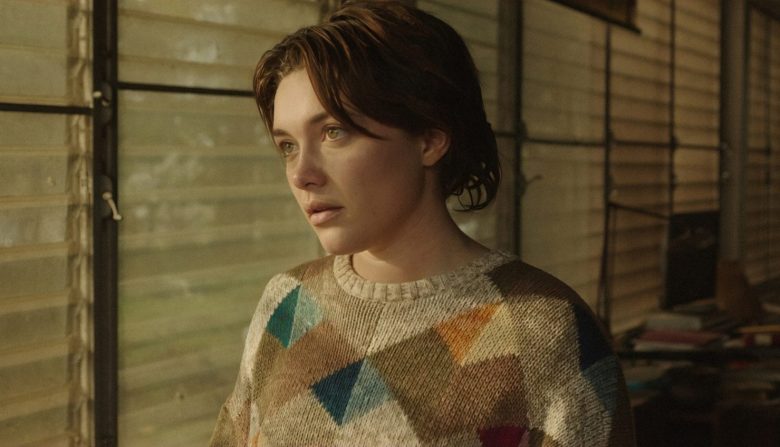Florence Pugh and Morgan Freeman try valiantly to carry this heavy-handed melodrama about a woman who survives a car crash.
At this point, the dulcet rumble of Morgan Freeman’s omniscient voiceover could almost qualify as its own genre. The legendary actor lends his considerable gravitas to the opening screed of “A Good Person,” another New Jersey-set drama from “Garden State” writer/director Zach Braff.
The film opens with an obvious metaphor about model trains that is very quickly hammered into the ground, along with a few too many other themes and plot lines. With model trains, you see, one can construct “a world where the hobbyist plays omnipotent creator,” says Freeman, before sealing it with the winking clincher: “In life, of course, nothing is nearly as neat and tidy.” If only filmmaking were more like model-train-making, Braff could have kept “A Good Person” from going so wildly off the rails.
The film centers on 26-year-old Allison, or Ali, played with unrestrained bravery by Florence Pugh, who finds herself stuck in the throes of opioid addiction after surviving a fatal car crash in which she was the driver. Ali had a bright future ahead of her before the accident, as shown in a blissful engagement party capped off with her earnest performance of The Velvet Underground’s “After Hours.” (For what it’s worth, Pugh has a lovely voice, and appears to play the piano herself.) As she sings, her fiancée Nathan (Chinaza Uche) looks at her with uncomplicated joy, though it’ll be the last time.
While driving into the city to try on wedding dresses with her soon-to-be sister-in-law and her husband, Ali looks down briefly at her maps app before noticing a construction vehicle about to swing into traffic. When she wakes up in pain begging for more morphine, she receives the tragic news that she is the sole survivor of the accident.
The movie then jumps ahead one year to find Ali living in her childhood home in West Orange with her mother Diane (Molly Shannon) and battling a nasty dependency on Oxycontin. “We said we were going to ween off them,” Diane says, before flushing Ali’s last few pills. As she panics, cries, and rifles through the medicine cabinet, suddenly the film swings wildly into addiction melodrama territory. Donning a sloppy cardigan and choppy bob she cut herself, she takes off for the pharmacy on her teeny, tiny child-sized bike.
Shut down by the pharmacist and a childhood friend who works in the pharmaceutical industry, she finds herself downing tequila in a local dive bar, where she is recognized by two former high school classmates. Sensing an in, she asks if they have any pills. The anachronistic scene takes a dark turn when scuzzy Mark (Alex Wolff) cruelly forces her to say “I’m a fuckin’ junkie” before helping her out. The whole thing feels forced and cliche, as does the image of Ali smoking crack in an alleyway, which she does after being told “it’s all the same thing.”
After all of this exhausting setup, the film sort of finds its stride, or at least gets to the meat of the story. The harrowing bar experience having helped Ali see she has a problem, she wanders timidly into a local 12-step meeting. She is surprised to find Nathan’s father Daniel (Morgan Freeman), who is now saddled with raising his orphaned 16-year-old granddaughter Ryan (Celeste O’Connor). Masking his bitterness toward Ali, Daniel kindly urges her to stay for the meeting, speaking from his experience as a sober alcoholic. (Though there are too many other strange choices in Braff’s script that pointing it out seems irrelevant, he sweeps past the fact that N.A. and A.A. are two different programs.)
The heart of the film becomes Daniel and Ali’s healing friendship, in which they bond over stories about Nathan, insights into raising rebellious teenage girls, and of course, model trains. Though the film is meant to be Ali’s journey, Braff gives Daniel a whole back story about his father’s alcoholism, his own failures as a father, and — what else? — his love of model trains.
“So much of my life has been out of control,” he says from the basement where he has constructed a miniature replica of the entire town of West Orange. “Down here, I get to decide.”
Though their relationship is by far the most interesting in the film, “A Good Person” loses whatever sense of purpose it had when the focus splits so dramatically toward Daniel and Ryan. Though Pugh valiantly muscles through the melancholy beats of Braff’s melodrama, there are too many other characters and plot threads to allow her to do much besides heave the story forward.
After a chaotic trip into the city to save Ryan from a scary party in Williamsburg tests the limits of their friendship, it’s Daniel and not Ali who delivers the titular line, “I’m a good person.” Whatever journey this befuddled character was carrying has been co-opted, albeit by a very kindly older gentleman. When all is said and done, the film feels as slight and synthetic as a model train set.
Grade: C-
MGM releases a “A Good Person” in theaters on Friday, March 24.
Sign Up: Stay on top of the latest breaking film and TV news! Sign up for our Email Newsletters here.
